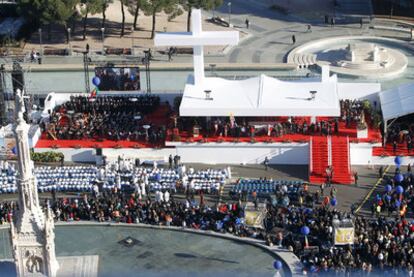Abortion a bigger problem than joblessness, says Catholic Church
Bishop warns of UNESCO plan to "make half the world population homosexual"
Cardinal Archbishop Antonio Rouco Varela used an open-air gathering in Madrid's Plaza Colón on Friday to attack the policies of the previous Socialist Party government, calling for a repeal of legislation that provides for abortion on demand, as well as same-sex marriage.
"Life is a sacred right that humans have been given by God," Rouco told the faithful gathered in bright winter sunshine from a stage dominated by a 68-meter-long altar and backed by a 12-meter-high cross.
Rouco railed against the current situation in Spain and Europe, declaring that Christ had lived in times of historic blindness, and that we were now in one of those times.
"The family is under attack in Spain," said the archbishop, who is also the chairman of the Spanish Bishops Conference, insisting that abortion and euthanasia in Europe was a deeper crisis than the economy or politics.
Also present at the Mass, the first major open-air event staged by the Roman Catholic Church in Spain since the Popular Party (PP) government took office last week, were some 30 bishops from around the country. Pope Benedict XVI, in a message from Rome, said the Christian family must be a "refuge for loyalty, respect and understanding."
"Whoever refuses to defend a conceived but unborn person is committing a serious violation of moral order. The death of an innocent can never be legitimized. To do so is to undermine the basis of society," said the pontiff.
The gathering in Madrid under the motto "Christian Family: the hope of Europe" was organized by the Bishops Conference and Catholic organizations.
Organizers had expected up to 500,000 worshippers, but police said the figure was much lower.
The Spanish Catholic Church is also concerned about homosexuality. During his Boxing Day sermon, the Bishop of Córdoba, Demetrio Fernández, said there was a conspiracy by the United Nations. "The Minister for Family of the Papal Government, Cardinal Antonelli, told me a few days ago in Zaragoza that UNESCO has a program for the next 20 years to make half the world population homosexual. To do this they have distinct programs, and will continue to implant the ideology that is already present in our schools."
Spain brought its abortion laws in line with most other European countries in 2010, allowing abortion on demand up to 14 weeks of pregnancy and up to 22 weeks if there is fetal malformation or threat to the health of the mother.
Before its introduction abortions were offered under restricted circumstances and rarely in a public hospital. Terminations were allowed only until the 12th week of pregnancy in cases of rape or until the 24th week if a woman's mental or physical health was in danger.
The legislation saw a series of huge demonstrations by pro-lifers across Spain, supported by the Catholic Church and the PP.
Pope Benedict XVI launched an implicit attack on the reforms when he visited Barcelona's Sagrada Familia in November 2010, warning of a "strong and aggressive secularism" that was undermining traditional family values.
Prime Minister Mariano Rajoy has said he will repeal some aspects of the legislation, but has yet to clarify what exact measures he will take. "We will change the current legislation model relating to abortion in order to reinforce the protection of the right to life as well as female minors," states the electoral program, the key issues of which were published by Spanish media on Sunday.
"Motherhood must be protected and supported. We will defend a law protecting motherhood with measures helping pregnant women, in particular those in difficult situations," the PP said during the election campaign.

Tu suscripción se está usando en otro dispositivo
¿Quieres añadir otro usuario a tu suscripción?
Si continúas leyendo en este dispositivo, no se podrá leer en el otro.
FlechaTu suscripción se está usando en otro dispositivo y solo puedes acceder a EL PAÍS desde un dispositivo a la vez.
Si quieres compartir tu cuenta, cambia tu suscripción a la modalidad Premium, así podrás añadir otro usuario. Cada uno accederá con su propia cuenta de email, lo que os permitirá personalizar vuestra experiencia en EL PAÍS.
En el caso de no saber quién está usando tu cuenta, te recomendamos cambiar tu contraseña aquí.
Si decides continuar compartiendo tu cuenta, este mensaje se mostrará en tu dispositivo y en el de la otra persona que está usando tu cuenta de forma indefinida, afectando a tu experiencia de lectura. Puedes consultar aquí los términos y condiciones de la suscripción digital.







































